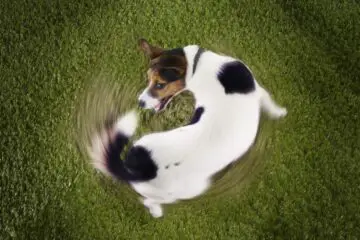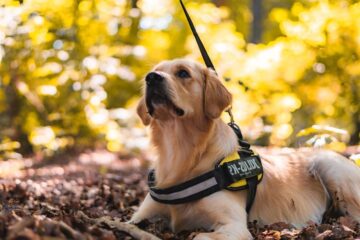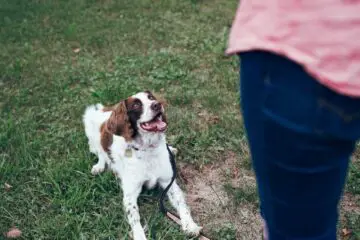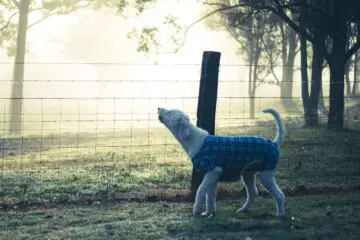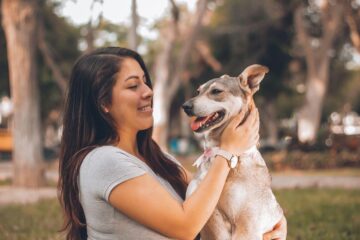Key Takeaways
- Twitching in dogs is a normal phenomenon and usually nothing to worry about, though it may be associated with anxiety or fear.
- Seizures are more serious and can cause convulsions and death; if your dog experiences any of the listed symptoms, seek veterinary care immediately.
- Dogs often dream just like humans, which causes them to twitch during sleep as a reflexive response to what they are experiencing in their dream.
- If you notice that your dog is having frequent nightmares or seems to be in pain while twitching during sleep, speak with your veterinarian for further advice on how best to help him/her.
Twitching in Dogs
Twitching in dogs refers to short, irregular movements. It is sometimes referred to as tremors. Twitching can be mild or severe and can affect any part of the dog’s body. Calm down, it’s not only about your dog. Most canines twitch in their sleep. Pet scientists have studied this phenomenon, which is known as myoclonic twitches. Vets tell us that dogs dream just like humans, which can lead to dogs twitching in sleep!
As we write this, your dogs are probably napping next to you. Every once in a while, they’ll twitch in their sleep; their eyes, nose, lips, and feet moving as if they were dreaming about chasing something. You may ask, why does my dog twitch in his sleep? Time to get the answer to this burning question.
Why Does My Dog Twitch in His Sleep?
The primary cause of twitching in dogs is unknown, but most often it just means your pup is having a grand time snoozing off. Some experts say that rarely, it could be associated with anxiety or fear. The extent of the dog’s twitching determines the level of his distress. There is no single cure for twitchy dogs, but various treatments can help relieve the dog’s anxiety or fear. Treatment may include medication, training, physical therapy, and behavior modification.
Should I Wake My Dog While He’s Twitching?
There seems to be a lot of disagreement on this topic, with many people claiming that it’s OK for their dog to twitch while they’re sleeping and others insisting that the dog should always be woken up if it’s excessive. So which is the right thing to do?
As dogs age, their movements become slower, and they may twitch even more during sleep. For some dogs, this may be a comforting noise or reflex. However, for others it may cause anxiety or restlessness. It is up to the owner to decide whether they want to allow their dog to twitch while they are sleeping.

What If My Pooch Is Having a Seizure?
If your dog is having a seizure, you will see uncontrollable muscle twitching that can last for several minutes. He may also lose consciousness and urinate or defecate involuntarily. It’s important to stay calm and not try to restrain your dog during a seizure, as this can increase his anxiety and make the seizure worse. Once the seizure has ended, take your dog to the vet to find out what may have caused it.
Symptoms of Seizures in Dogs
Seizures in dogs can range from mild to severe, and the symptoms can vary depending on the severity of the seizure. Some of the most common symptoms of seizures in dogs include loss of consciousness, muscle twitching, excessive drooling, and loss of control over bowel movements. In more severe cases, seizures can cause convulsions and death. If your dog experiences any of the listed symptoms, it is important to seek veterinary care immediately. With prompt treatment, most dogs with seizures can lead happy and healthy lives.
The Benefits of Twitching in Dogs
So why does my dog twitch in his sleep, and is twitching beneficial for him? The pros of allowing a dog to twitch during sleep are that it can be comforting for some dogs. It is a reflex that has been seen as soothing by many. As mentioned, it may help to soothe them during sleep and can be seen as a sign of affection.
For dogs that twitch a lot while they sleep, it can help to break the cycle of twitching and can provide some relief from the constant vigilance.
Is There Anything You Can Do to Help Alleviate the Twitchy Behavior?
Luckily, you don’t have to worry about the twitching because it’s completely normal and can occur from time to time. But where does healthy movement end and medical-related twitching start? You should be worried when the twitching takes the form of a full-body tremor, making your furry friend’s body go stiff or when this lasts longer than a brief spasm. In this case, there may be another explanation for the twitching, like the one below.
Editor’s Note
While twitching in our furry friends is usually a non-threatening occurrence, be sure to seek vet care immediately if your pup’s movements become too drastic. Seizures can lead to serious consequences but with the right attention and TLC from you and their doctor, they’ll bounce back safe and sound!
Other Reasons for Twitching
Why does my dog twitch in his sleep apart from the reasons above? Twitching or hiccups usually occur as a result of muscle spasms by the diaphragm; they can be caused by anxiety, parasites, allergies, eating, or drinking too fast among others. It would be a good idea to have the vet check him out to ascertain the main cause of the hiccups.
If the twitching does occur frequently in a pet that is awake, though, then you need to let your vet know. And if it is excessive twitching, then you also need to take note, because this could be due to a neuromuscular condition such as seizure activity, tick paralysis or even an electrolyte imbalance caused from malnutrition.
Do Dogs Dream While They Sleep?
This is a question that has long been debated by dog owners and pet professionals. Some believe that all dogs do dream, while others believe that only some breeds of dogs (specifically those with high levels of intelligence) may experience dreaming during slumber. There is no definitive answer to this question, as it depends on the individual dog’s temperament and overall health.
Although sleep is usually considered a time for rest and relaxation, many scientists believe that dogs do, in fact, dream while they’re sleeping. This is because many behaviors that are seen as indicators of dreaming, such as dogs yawning, panting, and pacing – are also seen during sleep.
Evidence for the dream hypothesis comes from the observation that dogs act and react in the same way during sleep as they do when they’re active. For example, when a dog is dreaming, he or she may crouch down or keep his or her head lowered – positions that are often assumed during hunting.
It’s also been observed that dogs may move their legs or tails while they’re asleep, which is likely due to the fact that they’re replaying past experiences in their dreams. While there’s no sure way to know whether dogs dream or not, the dream hypothesis is the most widely accepted explanation for why dogs behave the way they do during sleep.
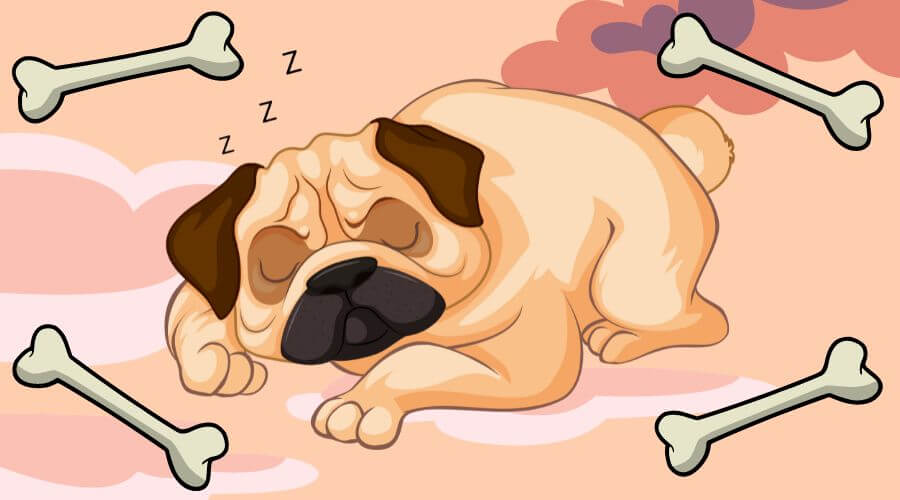
Twitching in Dogs. Summary
Twitches are brief, rapid movements of an entire body or a part thereof. Twitching may occur spontaneously and without any apparent cause, but it is more commonly the result of stimuli that excite the nerve endings in one or more areas of the skin. The most common type of twitch is called a myoclonus, which is also known as clonic muscle movement disorder.
Most dog owners are familiar with the sight of their beloved pet kicking, paddling or twitching in their sleep. While this may look strange, it is actually quite normal. Dogs often dream, just like humans, and the physical movement is simply a reflexive response to what they are experiencing in their dream.
There is no need to worry if your dog appears to be uncomfortable or in distress, as they will usually settle back into a deep sleep within a few minutes. If you notice that your dog is having frequent nightmares or seems to be in pain, however, it may be worth speaking to your veterinarian to rule out any underlying health issues. In the meantime, try to make your dog’s sleeping environment as calm and comfortable as possible. This may help to reduce the frequency of bad dreams.
So, why does my dog twitch in his sleep? Let us know if our answers have put you at ease!
Frequently Asked Questions
What Do Dogs Dream About When They Twitch?
Dogs typically twitch, kick, and move their legs during sleep because they are dreaming. It’s likely that they are dreaming about activities that they enjoy, such as running, chasing, and playing.
Is My Dog Having Seizures in His Sleep?
From deep slumber to distress, dogs can experience seizures even when asleep. If your canine companion is having these episodes during rest, make sure you take action and get in touch with a veterinarian immediately.
Is It Ok to Wake a Dreaming Dog?
While a sleeping pup may appear peaceful and content, disturbing them can cause unexpected confusion. For everyone’s safety, it’s wise to leave dreaming dogs undisturbed – even if they look too adorable not to snuggle!
What Does a Myoclonic Seizure Look Like in a Dog?
If you’ve ever seen your canine companion suddenly jerk or twitch their limbs, it could be indicative of a myoclonic seizure – an occurrence that should prompt you to get in touch with the vet as soon as possible. Don’t delay in giving them a call if Fido starts exhibiting these strange symptoms!
Thom Kenley is an author and loves writing about pets. He’s always been a pet lover, and he enjoys sharing his stories and tips with others who love their furry friends just as much as he does. He’s written articles for various websites and magazines, and he’s excited to continue writing about pets and helping owners keep their animals healthy and happy.
